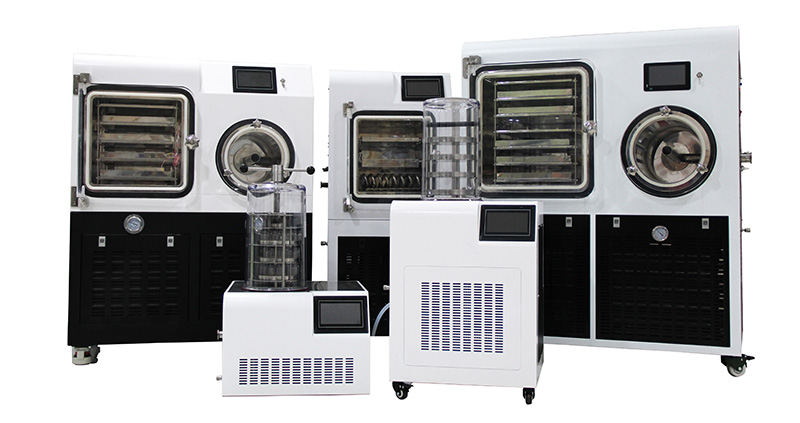Freeze dryer, also known as freeze dryer, is a device that uses low-temperature freezing and vacuum drying technology to directly transform substances from a frozen state to a solid dry state. It is one of the ideal equipment for achieving high efficiency and high-quality drying, and has been widely used in fields such as food, medicine, chemical engineering, biotechnology, etc.
The working principle of Shanghai Yetuo freeze-drying machine is to directly convert the moisture in the frozen state of the substance into water vapor through vacuum drying technology, thereby separating the moisture from the substance and achieving the purpose of drying. The entire process of a freeze dryer is divided into three steps: freezing, heating, and drying. During the freezing process, the substance will be cooled to a temperature of -50 ℃ to -80 ℃, forming a frozen state; During the heating process, the substance will be heated to a temperature above 0 ℃, and water will begin to evaporate; During the drying process, vacuum drying technology extracts water vapor to achieve drying.
The Shanghai Yetuo freeze-drying machine mainly consists of a freezing system, a vacuum system, a heating system, a control system, and an observation system. Among them, the refrigeration system is the most essential part of the freeze dryer, usually using a refrigeration machine for cooling. The vacuum system is the key to extracting water vapor in a frozen state, usually achieved by mechanical pumps or oil circuit pumps. The heating system is the key to transforming substances from a frozen state to a dry state, usually using heating elements such as electric heating wires or electric heating plates. The control system is used to control the operation of the entire freeze-drying machine and monitor the entire process. The observation system is used to observe the state of dry substances, usually using devices such as windows or cameras.
It effectively protects the stability and activity of the substance. In addition, freeze-drying machines also have the following advantages:
1. High fidelity: Freeze dryers can dry substances at extremely low temperatures and pressures, avoiding damage caused by high temperatures and oxidation. Therefore, freeze-drying machines can preserve the natural structure, chemical composition, and activity of substances, making the dried material closer to the original sample.
2. Long term preservation: The freeze-drying machine effectively extends the storage time of substances by removing moisture from them. The freeze-dried substance has a lower moisture content, which slows down the growth of microorganisms and chemical reactions, allowing the substance to maintain its original quality and stability for a long time.
3. Retain active ingredients: Many drugs, biologics, and natural products contain active ingredients that are crucial for maintaining their efficacy and biological activity. The freeze-drying machine can maintain the stability of these active ingredients during the drying process, ensuring that they still have good activity when redissolved or used.
4. Convenient storage and transportation: The freeze-dried material has a small volume, light weight, and is not easily spoiled, making it convenient for storage and transportation. Freeze dried substances typically exist in solid form and do not require refrigeration or low-temperature storage, greatly reducing storage and transportation costs and risks.
5. Wide application: Freeze dryers have a wide range of applications in fields such as food, medicine, biotechnology, and chemistry. In the food industry, freeze-drying machines can be used to dry fruits, vegetables, dairy products, etc., preserving their original flavor and nutritional content; In the pharmaceutical industry, freeze-drying machines can be used to prepare drugs, vaccines, antibiotics, etc., ensuring their quality and stability.
In summary, freeze-drying machines play an important role in scientific research, production, and laboratory settings due to their high efficiency, high-quality drying ability, and wide range of applications. It can not only preserve the original properties and active ingredients of substances, but also extend their storage time, facilitate storage and transportation, and provide reliable support for scientific research and production in various fields.


 Alibaba Store
Alibaba Store Tmall Store
Tmall Store Jingdong Sstore
Jingdong Sstore







